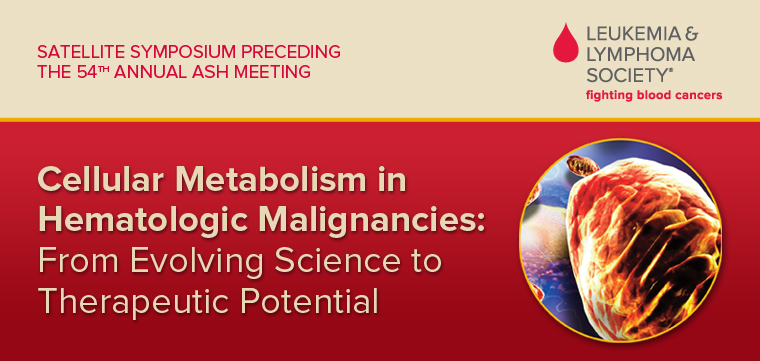

THANK YOU FOR YOUR INTEREST,
PRE-REGISTRATION IS CLOSED.
Onsite registration is available as space allows.
Please see registration staff in Atlanta.
FRIDAY, DECEMBER 7, 2012
CME Luncheon Symposium
12:30 PM - 4:30 PM
Atlanta Marriott Marquis
Atrium Ballroom A-B
265 Peachtree Center Avenue
Atlanta, GA
PROGRAM AGENDA
12:30 PM to 1:15 PM Registration/Lunch 1:15 PM to 1:20 PM Welcome Richard C. Winneker, PhD
The Leukemia & Lymphoma Society1:20 PM to 1:50 PM Introduction and Overview: Metabolic Targets in Leukemia and Lymphoma Chi V. Dang, MD, PhD 1:50 PM to 2:20 PM Metabolism and Apoptotic Pathways in Leukemia Jeffrey C. Rathmell, PhD 2:20 PM to 2:50 PM mTOR Links Cell Signaling and Metabolism Mariusz A. Wasik, MD 2:50 PM to 3:20 PM Genetic and Metabolic Alterations in Myeloproliferative Neoplasms and AML Ayalew Tefferi, MD 3:20 PM to 3:50 PM Targeting Autophagy in Hematologic Malignancies John L. Cleveland, PhD 3:50 PM to 4:30 PM Question-and-Answer Session
FACULTY
Chi V. Dang, MD, PhD
John H. Glick, MD, Professor of Medicine
Director, Abramson Cancer Center
University of Pennsylvania
Perelman School of Medicine
Philadelphia, PA
Jeffrey C. Rathmell, PhD
Associate Professor
Department of Pharmacology and Cancer Biology
Department of Immunology
Sarah W. Stedman Nutrition and Metabolism Center
Duke University
Durham, NC
Mariusz A. Wasik, MD
Professor
Department of Pathology
University of Pennsylvania
Perelman School of Medicine
Philadelphia, PA
Ayalew Tefferi, MD
Professor of Medicine
Division of Hematology
Mayo Clinic
Rochester, MN
John L. Cleveland, PhD
Professor and Chair
Department of Cancer Biology
The Scripps Research Institute
Scripps, FL
TARGET AUDIENCE
This activity is designed for hematologists, oncologists, and other healthcare professionals who wish to enhance their knowledge of advances in cellular metabolism and implications in treating patients with hematologic malignancies.
STATEMENT OF NEED
Over 80 years ago, world-renowned biochemist Otto Heinrich Warburg observed that cancer cells exhibited high glycolysis (glucose conversion to lactic acid) even in the presence of oxygen (Warburg effect). However, not until the last decade did the reprogramming of cellular metabolism regain deserved attention for its role in cancer.
A number of common oncogenes and tumor suppressor genes have been discovered that directly control cell metabolism. In addition, a number of metabolic enzymes causally mutated in a variety of human cancers including hematological malignancies have now been identified as human tumor suppressors or oncogenes. The reprogramming of metabolic pathways is essential for tumors to survive and proliferate in their microenvironment. As a result of these more recent developments, several pharmacologic therapies have been developed and are currently under evaluation in clinical trials for their safety and efficacy in the treatment of both solid and hematologic cancers.
Cancer cell metabolism and the Warburg effect are promising targets for cancer treatment. However, physicians may lack the clinical and biochemical knowledge of the basic science behind the Warburg effect. In addition, physicians may not be up-to-date on the agents that are currently under evaluation in clinical trials. Some of these agents are in late-stage clinical trials and have demonstrated promising results. Therefore, it is important that physicians understand the basic science of the Warburg effect and the emerging pharmacologic agents that may reach the clinic, which may provide important additional options for the treatment of cancer. This knowledge will allow physicians to effectively implement these new therapies in their clinical practice, potentially improving patient outcomes and quality of life.
EDUCATIONAL OBJECTIVES
After completing this activity, participants should be better able to:
- Describe how metabolic reprogramming contributes to tumor transformation and sustains progression in blood cancer cells
- Assess the therapeutic potential of targeting metabolic changes as they relate specifically to hematologic malignancies
- Apply new strategies for incorporating therapies that target metabolism in blood cancers
- Utilize the information presented from current and future clinical trials that evaluate cancer metabolism in order to better manage patients with hematologic malignancies
- Explain the basis for therapies that affect cancer cell metabolism
PHYSICIAN CONTINUING EDUCATION CREDIT
ACCREDITATION STATEMENT
This activity has been planned and implemented in accordance with the Essential Areas and policies of the Accreditation Council for Continuing Medical Education through the joint sponsorship of The Leukemia & Lymphoma Society, RMEI, LLC and Postgraduate Institute for Medicine. The Postgraduate Institute for Medicine is accredited by the ACCME to provide continuing medical education for physicians.CREDIT DESIGNATION STATEMENT
The Postgraduate Institute for Medicine designates this live activity for a maximum of 3.25 AMA PRA Category 1 Credit(s)™. Physicians should claim only the credit commensurate with the extent of their participation in the activity.
DISCLOSURE OF CONFLICTS OF INTEREST
Postgraduate Institute for Medicine (PIM) requires instructors, planners, managers and other individuals who are in a position to control the content of this activity to disclose any real or apparent conflict of interest they may have as related to the content of this activity. All identified conflicts of interest are thoroughly vetted by PIM for fair balance, scientific objectivity of studies mentioned in the materials or used as the basis for content, and appropriateness of patient care recommendations.
FEE INFORMATION
There is no fee for this educational activity. Per regulatory guidelines, the educational grants used to support this activity may only be used for medical professionals attending the activity. Participation by non-healthcare providers and/or guests is not permitted.
AMERICANS WITH DISABILITIES ACT
Event staff will be glad to assist you with any special needs (physical, dietary, etc.). Please contact us prior to the live event at (866) 992-9950, extension 338.
STATEMENT OF SUPPORT
This activity is jointly sponsored by The Leukemia & Lymphoma Society, RMEI, LLC and Postgraduate Institute for Medicine and supported by an educational grant from Celgene Corporation.
For information on leukemia, lymphoma or myeloma contact an LLS Information Specialist at (800) 955-4572 or infocenter@LLS.org. Or visit www.LLS.org.
Laurel Office Plaza | 101 Laurel Road, Suite 200 | Voorhees, NJ 08043 | www.RMEI.com | (866) 770-RMEI